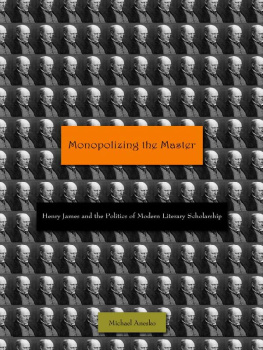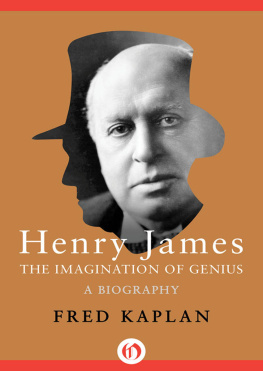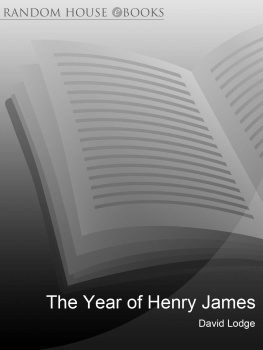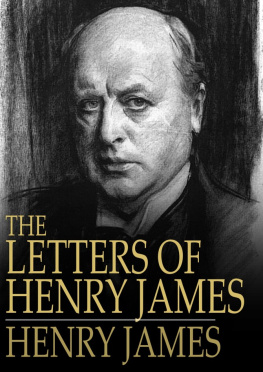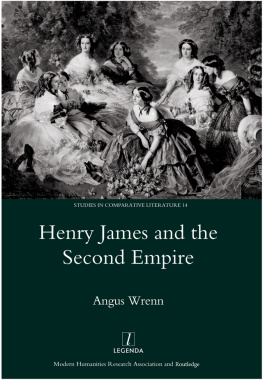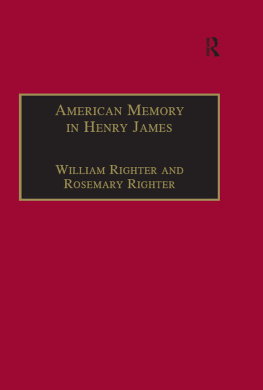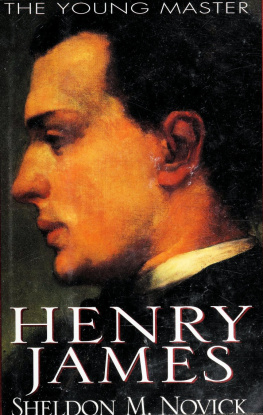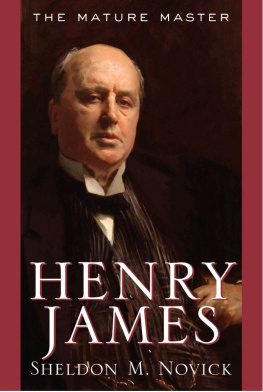James Henry - Monopolizing the Master Henry James and the politics of modern literary scholarship
Here you can read online James Henry - Monopolizing the Master Henry James and the politics of modern literary scholarship full text of the book (entire story) in english for free. Download pdf and epub, get meaning, cover and reviews about this ebook. City: Stanford, year: 2012, publisher: Stanford University Press, genre: Detective and thriller. Description of the work, (preface) as well as reviews are available. Best literature library LitArk.com created for fans of good reading and offers a wide selection of genres:
Romance novel
Science fiction
Adventure
Detective
Science
History
Home and family
Prose
Art
Politics
Computer
Non-fiction
Religion
Business
Children
Humor
Choose a favorite category and find really read worthwhile books. Enjoy immersion in the world of imagination, feel the emotions of the characters or learn something new for yourself, make an fascinating discovery.
- Book:Monopolizing the Master Henry James and the politics of modern literary scholarship
- Author:
- Publisher:Stanford University Press
- Genre:
- Year:2012
- City:Stanford
- Rating:4 / 5
- Favourites:Add to favourites
- Your mark:
- 80
- 1
- 2
- 3
- 4
- 5
Monopolizing the Master Henry James and the politics of modern literary scholarship: summary, description and annotation
We offer to read an annotation, description, summary or preface (depends on what the author of the book "Monopolizing the Master Henry James and the politics of modern literary scholarship" wrote himself). If you haven't found the necessary information about the book — write in the comments, we will try to find it.
Monopolizing the Master Henry James and the politics of modern literary scholarship — read online for free the complete book (whole text) full work
Below is the text of the book, divided by pages. System saving the place of the last page read, allows you to conveniently read the book "Monopolizing the Master Henry James and the politics of modern literary scholarship" online for free, without having to search again every time where you left off. Put a bookmark, and you can go to the page where you finished reading at any time.
Font size:
Interval:
Bookmark:
HENRY JAMES AND THE POLITICS OF MODERN LITERARY SCHOLARSHIP
Michael Anesko

Stanford University Press
Stanford, California
2012 by the Board of Trustees of the Leland Stanford Junior University. All rights reserved.
No part of this book may be reproduced or transmitted in any form or by any means, electronic or mechanical, including photocopying and recording, or in any information storage or retrieval system without the prior written permission of Stanford University Press.
This book has been published with the assistance of the College of the Liberal Arts and the Department of English of The Pennsylvania State University.
Printed in the United States of America on acid-free, archival-quality paper
Library of Congress Cataloging-in-Publication Data
Anesko, Michael, author.
Monopolizing the Master : Henry James and the politics of modern literary scholarship / Michael Anesko.
pages cm
Includes bibliographical references and index.
ISBN 978-0-8047-6932-7 (alk. cloth)
1. James, Henry, 18431916. 2. Authors, AmericanBiographyHistory and criticism. 3. James, Henry, 18431916Criticism and interpretationHistory20th century. 4. James, Henry, 18431916Archives. 5. James, Henry, 18431916Family. I. Title.
PS2123.A66 2012
813.4dc23
2011022751
Typeset by Bruce Lundquist in 9/15 Palatino
E-book ISBN: 978-0-8047-8264-7
This book is for
Warner Berthoff Dan Aaron Bernard Bailyn
Teachers, Colleagues, Friends
At least since Darwins time, biologists have liked to remind us that the health of many ecosystemsindeed, the survival of many speciesdepends upon the otherwise unheralded work of parasites. The seemingly perverse symbiosis between such lowly creatures and the more conspicuous hosts who afford them life is a crucial element in natures vast design. Much of the work of culture is done by similar organisms. The modern universe of literature would be unthinkable without the hungry tribe of critics, scholars, and biographers who feed on the lives and works of more celebrated othersthe authors who inhabit and define the domain of public letters.
For reasons not hard to discern, the work of literary biographers, in particular, lends itself to this analogy. So many great writers have been shadowed by the men (of course they were men) who were in a privileged position to tell the life histories of their subjects: Doctor Johnson can hardly be imagined without his two-volume Boswell; Carlyle without his two-volume Froude; Dickens without his two-volume Forster. Lytton Strachey may have demolished the hagiographic archetype of such life-and-letters tomes when he published Eminent Victorians (1918); but modern literary biographers, if more critically disposed, have not escaped the veiled animus of parasitism that is concomitant with their work, which so often depends upon the discovery of materialsdiaries, letters, drafts, and miscellaneous documentsrarely intended for others to see. The determined biographer, as James Joyce slyly anticipated, was ever more likely to become an authors biografiend, an obsessive doppelgnger claiming exclusive priority to anothers life history. Monopolizing the Master tells the story of not one but many such biografiendsall of whom have sought to shape our understanding of Henry James by cornering the market on that writers cultural legacy.
Long before Pierre Bourdieu made the concept of cultural capital into a buzzword of contemporary literary criticism, another formidable thinkerthe Canadian polymath, Northrop Fryeoffered a salutary warning about the vagaries of defining it.
Monopolizing the Master chronicles the history of that recuperation, focusing especially on the strategies by which different critical cohorts have attempted to shapeideally to controlthe contours of Jamess posthumous reputation. Leon Edels domination of modern James studies has long been obvious (and frequently complained of), but no one really has explained how he gainedand assiduously worked to maintainhis peculiar advantage: controlling others access to the James archive. Still less appreciated is the extent to which Edels career epitomizes a logic of restriction that already had been put in motion before James died in 1916. Even then, family scruples (inflected more than a little by homophobic paranoia) seemed determined to perpetuate a discreet hagiography of the author, and his collateral descendants worked deliberately to frustrate what they considered unwanted speculation or investigation. The appearance of Van Wyck Brookss pseudo-psychological The Pilgrimage of Henry James (1925), which asserted that Jamess whole career was a testament to deracinated frustration and atrophy, galvanized his literary executors to thwart whomever they deemed incompetent from accessing sources that might disclose sensitive information about the James family.
Jamess contemporary acolytes (especially Percy Lubbock and Theodora Bosanquet) and the next generation of modernists who largely salvaged Jamess reputation (Eliot, Pound, and R. P. Blackmur) also, in their various ways, attempted to appropriate the Masters aura, wanting to transfer or borrow his cultural capital to shore up their own artistic agendas. While their motives and tactics differed widely, taken as a whole, they also worked to shape the contours of the Henry James with whom later readers and critics have had to reckon. Another key figure in this process was Harvard professor F. O. Matthiessen, whose brief and busy excursion into James (as Edel somewhat derisively described it) was largely responsible for the modern James revival. Edel was readyat the time of Matthiessens tragic suicide in 1950to crown himself as sole successor, or at least majority shareholder, in what would rapidly become almost a new industry. Postwar enrollments at American universities expanded in tandem with a revolution in paperback publishing, and an unceasing stream of James reprints soon began to appear (in the vast majority of which Edel had not merely a scholarly but also a considerable financial stake). It is hardly a coincidence that the 1971 New Yorker profile of Edel ran under a satirically pecuniary bannerChairman of the Board. Edels virtual monopoly of the field has of course been noted for some time, but only now can a detailed account of his campaign to ward off trespassers, as he termed them, be given, since the vast archive of his own papers only recently has been open to public inspection and use. Monopolizing the Master fittingly concludes with that final chapter, for it was only when the last volume of Edels biography was published that restrictions concerning the use and publication of the James papers were lifted.
Even though other scholars have touched upon certain aspects of this narrative, But new family materials since deposited at Harvard shed much light on those reasons; at the same time they expose many of the tensions and cross-pressures that would affect access to the archive for decades to come. Likewise, the more recent tactical forays made by researchers into Leon Edels papers at McGill have glanced at topical issuesespecially the details of his efforts to police the James archive at the expense of othersbut have not sufficiently appreciated the extent to which such actions align themselves with the longer history of efforts to control the construction of Henry James as a subject for biographical or critical analysis.
Literary historians usually trace the beginning of the James Revival to the years immediately following the end of the Second World War, when That weariness has proved ephemeral, however. We have been talking about Henry James (more or less intelligently) ever since: creatingand re-creatingthe forms of cultural capital he represents: possessingor possessed bythe Master.
Font size:
Interval:
Bookmark:
Similar books «Monopolizing the Master Henry James and the politics of modern literary scholarship»
Look at similar books to Monopolizing the Master Henry James and the politics of modern literary scholarship. We have selected literature similar in name and meaning in the hope of providing readers with more options to find new, interesting, not yet read works.
Discussion, reviews of the book Monopolizing the Master Henry James and the politics of modern literary scholarship and just readers' own opinions. Leave your comments, write what you think about the work, its meaning or the main characters. Specify what exactly you liked and what you didn't like, and why you think so.

